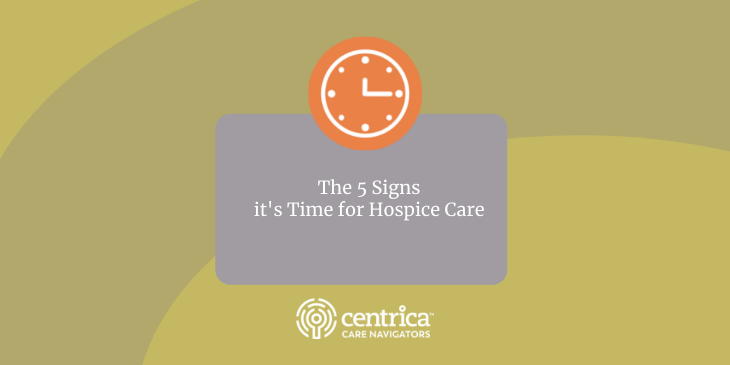Sometimes it’s hard to tell when it’s the right time to start hospice care for a loved one. Some people might seem fine until there’s a sudden change that sends them to the hospital. A regular doctor visit could wrap up with a conversation about hospice care, and a referral here to Centrica Care Navigators.
Other times, it’s up to you to look for the signs that compassionate end-of-life care is the right thing to do. There are several indications that hospice may be a good next step for a family member or friend.
1. Frequent hospitalization
People who are in the hospital regularly for conditions they haven’t had before might be ready for hospice care. Situations that can be easily handled with the guidance of a nurse or support of a hospice aide could instead be emergency room trips for you, if you don’t know what to do about them.
That can be time-consuming and expensive, but more importantly, it’s not really giving your loved one the comprehensive care each one of us needs.
2. Less interest in interacting with others
If someone appears confused or unable to react in a way that makes sense, they may be withdrawing and preparing for death. They may stop talking or sleep most of the day. There may be other times they are still thinking clearly and having a conversation as if nothing has changed. If you’re not sure what you’ll find when you visit with that person, it might be time for hospice care.
3. Appetite Changes
While people may need more sleep at the end of life, it’s possible they will need less food and drink. As the body’s activity starts to slow down at the end of life, a person may refuse food or eat only a bite or two of each meal.
4. Difficulty breathing, continuous pain
If you’re caring for a loved one, it might feel like you have to become a medical expert in addition to all the other things you do in a day. A person may need medication or assistance moving around. You’re likely not trained in managing medication. Or maybe or you can’t be near someone all every day because of work, family obligations, or some other reason.
If that’s your situation, you can find assistance from professional staff at Centrica Care Navigators. Being in serious pain is something that no one wants, especially someone who isn’t able to clearly communicate the way they’re feeling.
5. Unable to perform activities of daily living
There are six categories classified as the activities of daily living, the things everyone needs to be able to do to live independently:
- Personal hygiene (bathing, brushing teeth, etc.)
- Dressing (choosing appropriate clothing and putting them on)
- Continence (controlling bladder and bowels)
- Toileting (getting to, using, and cleaning up)
- Transfers or ambulation (moving from place to place unassisted)
- Feeding (eating meals)
There are related activities of daily living that are almost as essential: preparing food, using the phone, managing money, and driving are just a few. Someone who can’t accomplish the activities of daily living is probably someone who needs more professional attention.
People who start to receive end-of-life care are not trying to cure a disease or a condition. They have decided that they have a short time to live and they want to live it as well as they can.
According to the National Hospice and Palliative Care Organization, in 2019 patients were in hospice care with a median length of service of 18 days. Some people stay alive for months, even years, after a recommendation for end-of-life care, while others receive care for less than a week. But many are in care for about 2 and a half weeks.
That’s not a lot of time. It usually takes people a few weeks to get used to a new situation like a job or a move to a new neighborhood. It’s an even bigger change to go from an active life on your own to depending on a caregiver and hospice staff for most, if not all, of the things a person used to do for themselves.
But the number one thing our staff hears is, “I wish I would have called you sooner.” Recognizing these five signs it’s time for hospice is a good first step. At Centrica Care Navigators, though, we can help in many ways before hospice care is the best option, like having guests for a few hours at Centrica Adult Day. If there’s a loved one in your life who should have end-of-life care, we want to hear from you, even if you’re not yet seeing all the signs it’s time for hospice.
More time in care means more time to get ready to say goodbye. That of course means visiting with family and friends for a last time, but it also is an opportunity to get financial and personal affairs in order. The more time you and your loved ones have to prepare, the better off everyone will be after death.
It’s sometimes hard to tell when it’s the right time for end-of-life care, especially if it’s unfamiliar to you. (If it is unfamiliar, take a look around our website and talk to someone on our staff to learn how we can help.) Talking to a doctor is a step in the right direction. Talking to someone at Centrica Care Navigators is another.
Our Mission is to guide and support individuals and their caregivers coping with illness, aging, dying, and loss by providing compassionate medical, emotional, spiritual, and personal care.




